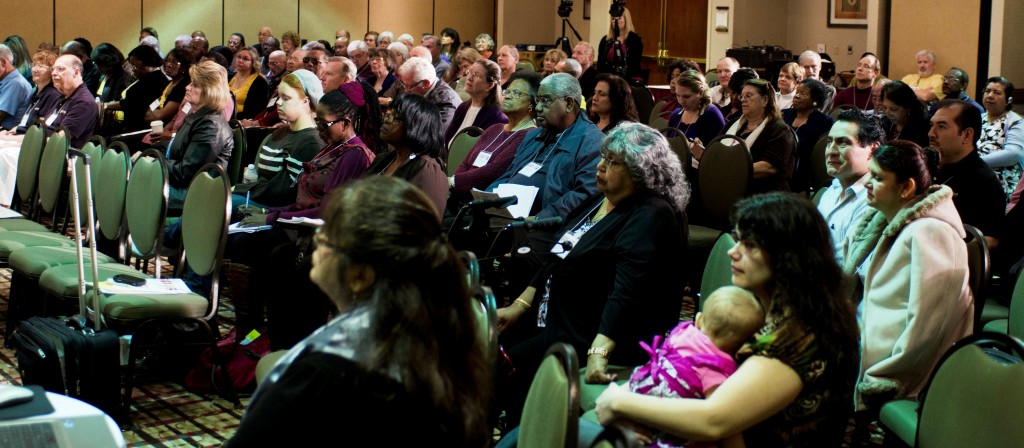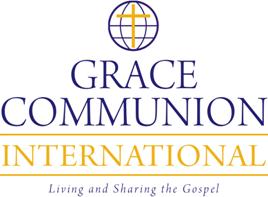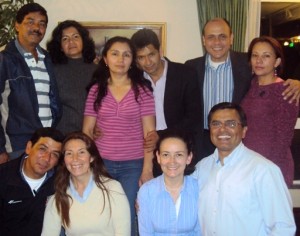Dear Brothers and Sisters in Christ,
We have just concluded the first of our 2012 US regional conferences. GCI members and friends gathered in Ontario, CA for three days of worship, dialog and presentations. I always look forward to these conferences—they are wonderful opportunities to renew old friendships and make new ones. Several more conferences are scheduled around the nation this year. I urge you to attend if you can.

At our conferences, I’m often asked to cast a vision for our denomination’s future in the way a CEO might cast a vision for a business. Though, for practical reasons, churches must embrace certain business practices, the Biblical model for leading the church is that of a shepherd or farmer rather than a business executive. This does not mean, of course, that we are called to sit back and do nothing. However, it explains why my approach is not to cast a vision but to gather a vision. Let me explain.
In the fifth chapter of Romans, Paul wrote: “We continue to shout our praise even when we’re hemmed in with troubles, because we know how troubles can develop passionate patience in us, and how that patience in turn forges the tempered steel of virtue, keeping us alert for whatever God will do next. In alert expectancy such as this, we’re never left feeling shortchanged. Quite the contrary—we can’t round up enough containers to hold everything God generously pours into our lives through the Holy Spirit!” (Romans 5:3-5, The Message Bible).
This passage describes the sense of hope and expectancy that I feel as I receive reports concerning what our congregations around the world are experiencing in Christ’s service. We have moved from being a denomination where our congregations existed to support a work that emanated from a central headquarters, to a network of congregations that are working under the overall umbrella of the denomination. Now, each congregation seizes opportunities that God presents to them locally to advance the overall work of the church globally.

I have the privilege of telling the stories of many of these congregations in my presentation at the regional conferences. Like Paul who couldn’t “round up enough containers” to hold everything, I do not have enough time to tell all the stories about the marvelous things the Holy Spirit is doing through our congregations. From these reports, I gather a picture of what God is doing with and through us. And that collage, rather than grandiose ideas I might come up with, is what frames my vision for our future as a denomination.
With that in mind, let me now share with you some thoughts concerning our mission and vision that I shared at the first of our 2012 regional conferences.
What is our mission?
 Grace Communion International is a people called together by God to share in the ministry that Jesus is doing through the Holy Spirit in our world. We are a communion of churches and denominational ministries with a shared mission, which is taking us toward the realization of a shared vision.
Grace Communion International is a people called together by God to share in the ministry that Jesus is doing through the Holy Spirit in our world. We are a communion of churches and denominational ministries with a shared mission, which is taking us toward the realization of a shared vision.
We are called to the same mission as all other followers of Jesus—it’s often referred to as The Great Commission. There are a number of ways to summarize this mission. We do so in our denominational motto: Living and Sharing the Gospel.
This motto, which appears in our denominational logo (see above), is not just a catchy slogan. It encapsulates our sense of calling to lock arms, sharing together in what Jesus is doing in our world, through the Holy Spirit, to fulfill the Father’s mission. We can expand this into a more complete mission statement: Grace Communion International is committed to living and sharing the good news of what God has done through Jesus Christ.
We pursue this mission by:
- Building healthy, Christ centered congregations that are sanctuaries of worship, friendship and nurturing pastoral care.
- Providing sound biblical teaching through our congregations, media and personal outreach in ways that are relevant and meaningful to people of diverse backgrounds and ages.
- Equipping people for Christian service so that the gospel can be known, understood and experienced.
- Sharing in the work of the gospel with the broader Christian community, acknowledging that we can learn from one another and that Christ’s love goes beyond denominational boundaries.
- Expressing the love of God to all through the work of the Holy Spirit in our lives.
The result of this mission focused work is lives transformed by the gospel, one person at a time. This is actually Jesus’ mission—and we are called to share in it with him. Through eyes of faith, we are able to see the transforming presence and activity of God that others are not yet seeing. It is not about us “taking God to people,” but rather helping people see the God who already is sharing his life and love with them. It’s not about helping people “find” Jesus, but of showing them the creative, life giving Savior who, through the Holy Spirit, is already present and at work in their lives.
What is our vision?
Our vision is a faith and hope-filled glimpse of what GCI will continue to become as we pursue our mission to live and share the gospel. We summarize our collective vision this way:
All kinds of churches for all kinds of people in all kinds of places.
Expanding it, we can say: Grace Communion International exists to help each congregation of Grace Communion International attain its God-given potential. Why this emphasis on local congregations? Because it is my belief that God’s primary instrument for realizing our collective vision is healthy local churches—here in the US and around the world. As I look ahead, I see us becoming more and more a growing, loving community of congregations that are dynamically living out God’s mission in a broken world, and that excites me!
Our core identity (who we are) is founded on our communion with the Father and Jesus, through the power of the Holy Spirit. And who we are drives what we do—our passionate participation in what God is doing in the world. In this way, our mission gives shape to our vision.
I look forward to sharing more about these things at future US regional conferences and on trips to other parts of the world. I hope to see you there!
Your brother in Christ,
Joseph Tkach
P.S. For locations and other information of future US regional conferences, see our web site (www.gci.org/event/12/conferences). Also, be sure to note in this issue the article (linked above, left) telling about our new US military chaplain support ministry.





